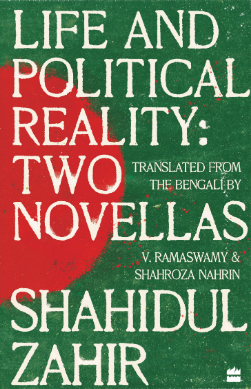A BOOK REVIEW BY RITUPARNA MUKHERJEE
V.Ramaswamy and Shahroza Nahrin’s translation of Shahidul Zahir’s Jibon O Rajnoitik Bastobota (1987) and Abu Ibrahimer Mrityu (1991) published in the year 2022 by Harper Perennial comes at a crucial point in the current geopolitical situation when religious fundamentalism and a curious divisiveness pervades the entire social fabric of human civilization. The two novellas, each of roughly the same length, deal with the postcolonial project of nation-building, in this instance, that of Bangladesh, whose originary tale is one of bloodshed and genocide, an event that is a not-so-distant memory for many people on both sides of Bengal today. Both novellas deal with the post-Liberation phase of Bangladesh in a very nuanced manner, delving into memories and events that connect the individual to his community and nation, building a bridge between the local microcosm and the national macrocosm.
Life and Political Reality, the best-known work of Zahir’s oeuvre, is a rich and intense read. The brevity of the text belies the scope of the narrative, itself wrought in a single paragraph, the narratorial voice echoes the fear, trauma and successive paranoia of its protagonist, Abdul Mojid, who for nine months of his adolescent life, from March to December 1971, witnesses unrelenting horrors that leave indelible footprints on his psyche. The story traverses deftly between the events of 1971 and the 1980s culminating in Mojid’s decision to leave his “mohalla”, his beloved locality of Lakshmi Bazar in Old Dhaka to prevent the recurrence of violence that marked the body of his elder sister, Momena in 1971. The incident that consolidates his decision is the starting point of this novel, when Abdul Mojid hears Abul Khayer, the son of the infamous Moulana Bodu, the local leader who had been a collaborator with the West Pakistani army and had been at the root of murder and bloodshed of his own neighbours, address the people of his locality as “bhaishob”, brothers. Along with his sandals giving way with an epiphanic phot, it is this moment when Mojid gives up his hope and faith in any ounce of idealism, fairness and justice that had marked the pro-liberation campaign. He is especially disheartened when Ajij Pathan, the pro-liberation leader in the community, chooses to forgive and forget Moulana Bodu, to further his own way in national politics:
“… after all, in politics there was no such thing as friends for life or enemies for life, and so, what else could people do but forget the past? But the people of Lakshmi Bazar who kept on forgetting the past saw that their past broke through unremittingly through the soil and sprang up, like shoots of grass” (63).
The entire narrative veers between the individual memory of Abdul Mojid, the collective memory of the people of the locality and the construction of the cultural memory by leaders like Moulana Bodu who alter the memory narrative to suit their own needs. Therefore, the novella posits the central question- who is a martyr? The seven innocent men who were killed by Bodu when the military arrived? Momena, who was raped and murdered because she opposed Bodu’s patriarchal project of religious fundamentalism in his locality? Abdul Bashar, Moulana Bodu’s youngest son who failed to stick to the patriarchal script of his father because he was a hermaphrodite? Or Bodu’s own candidate, Abdul Goni, the paramilitary who roamed the locality and exercised his petty power over the innocent people? It highlights the very important question of who gets to control the narrative of how history is remembered and narrativized.
The second novella, Abu Ibrahim’s Death, in the translator’s own words is a quieter accompaniment to its more intense predecessor, Life and Political Reality, but is by no means less impactful. It charts the sudden, premature death of Abu Ibrahim. However, for the readers the death of Abu Ibrahim is built through the plot in a very Marquezian style, where the image of the Abu Ibrahim’s bier being carried for its funerary rites appears in the beginning and the entire plot builds up to this moment through a flashback. The story is temporally located against the backdrop of one of the many military coups in the late 1980s and early 1990s, a moment of political and therefore, social instability. Abu Ibrahim is a mid-level government clerk employed in the finance department at the Government Secretariat who gets promoted to the commerce department and dreams of owning a piece of land in Dhaka. His professional and family life speaks of the frustrations of educated middle-class in a steadily urbanised capital city where the only open space away from the suffocating home and office spaces comes in the form of public roads and apartment balconies. Abu Ibrahim, frustrated with work, often an outsider in his own family life, finds familiarity in the public spaces of the roads nearby his home and university where he walks and sits with his daughter at odd hours of the night, much to his wife Mamata’s chagrin. What is interesting is that although he comes across his old, repudiated love, Helen, rather suddenly, he fails to act on his desire for intimacy over concerns of the construct of the ideals of middle-class family life. Just like he fails to accept the bribe by the businessman Kahled Jamil, because his ideals urge him to be fair. He cannot easily reconcile himself to his friend Siddiq’s “love and be loved” mantra that brings about a certain unease in him. It is this restlessness and his oscillation between honesty and the promise of a better life that leads to his death in broad daylight in the openness of the very streets he loves. In an especially significant exchange Zahir highlights the socio-political condition of post-independence Bangladesh that has failed to create a safe space for the honest:
“…But we can’t be friends if you drink Fanta while I drink whisky.”
“Why can’t you also drink Fanta?”
Khaled Jamil laughed. They figured out that there was no likelihood of being in agreement on such matters. (146)
There is a certain dispassionate distance and restraint in the narratorial voice that renders Abu Ibrahim’s death, “lighter and more insignificant than a goose feather” (173) very poignant. The same is true in Life and Political Reality where in no time, while describing the horrific deaths or the macabre feeding of human flesh to the crows, does the narrative devolve into sentimentality. Perhaps it is this matter-of-fact rendition laced with subtle irony and humour that makes the discovery of Momena’s defiled body so heart-rending. Zahir’s narratorial style is also marked by an efficient use of animal imagery in the two novellas- crows, rats, termites, mice, ants- to heighten the sense of horror, fear or claustrophobia as well as the dehumanization in a political context marked by bloodshed. The translator’s decision to retain certain regionalisms in form of Romanized direct speech followed by their English gloss, firmly roots the narrative in Bangladesh while making it universal on account of the reading experience.
The two novellas coupled for this collection are by no means a random choice. Both are tales of loss, of social and political violence, non-linear, cyclical narratives whose protagonists are embodiments of abject masculinity, failing to protect what they hold most dear, of repressed rage and crippling disappointment with the system that has failed the everyman over and over again, a space where
“Can a man ever avoid being mad?” (88)
Also, read The Charm by Chandrakiran Saunriksa translated from the Hindi by Vignesh Hampapura, and published in the Antonym:
Follow The Antonym’s Facebook page and Instagram account for more content and exciting updates.



























0 Comments